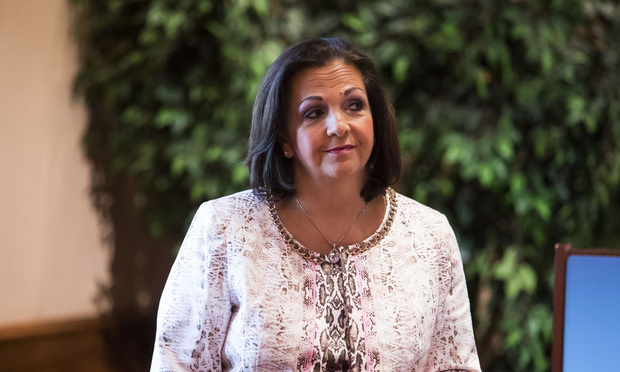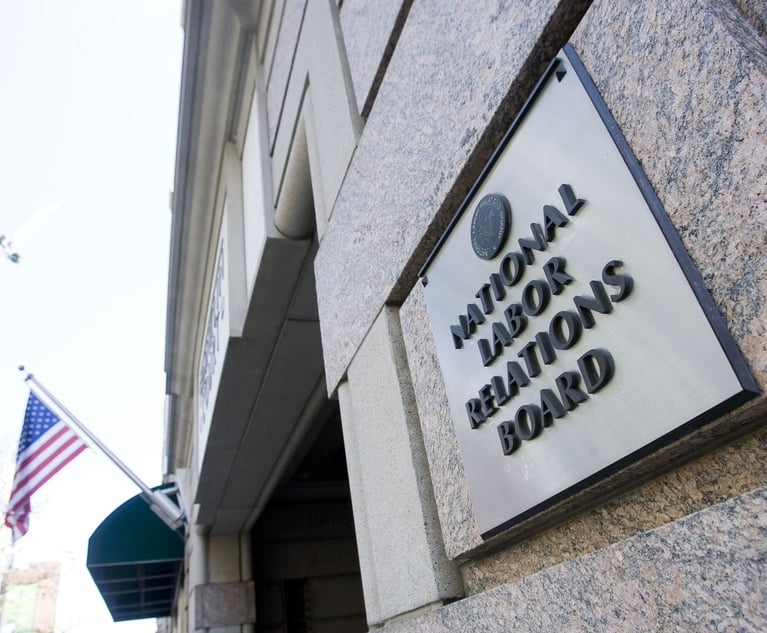US Chamber Legal Leader Warns of Flood of Lawsuits if Congress Ends Forced Arbitration
Rickard issued a statement Thursday after two Democratic members of Congress introduced measures in the House and Senate to end forced arbitration clauses in company contracts and employee handbooks.
February 28, 2019 at 05:04 PM
4 minute read
 Lisa Rickard, president of the U.S. Chamber Institute for Legal Reform at the U.S. Chamber of Commerce, during an event held at the Chamber titled “CFPB's Anti-Arbitration Rule: Analysis & Implications,” on July 19, 2017. Photo: Diego M. Radzinschi/ALM
Lisa Rickard, president of the U.S. Chamber Institute for Legal Reform at the U.S. Chamber of Commerce, during an event held at the Chamber titled “CFPB's Anti-Arbitration Rule: Analysis & Implications,” on July 19, 2017. Photo: Diego M. Radzinschi/ALM
Corporations and their general counsel can brace for a flood of class action lawsuits if Congress passes legislation introduced Thursday aimed at eliminating forced arbitration, according to Lisa Rickard, president of the U.S. Chamber Institute for Legal Reform.
Rickard issued a statement Thursday after two Democratic members of Congress introduced measures in the House and Senate to end forced arbitration clauses in company contracts and employee handbooks. The legislation is called the Forced Arbitration Injustice Repeal Act or the FAIR Act; Rickard called it a “forced litigation” act.
A spokesperson at JAMS, an alternative dispute resolution center, told Corporate Counsel, “JAMS doesn't take positions on legislative or public policy as we are a neutral organization.” Eric Tuchmann, general counsel of the American Arbitration Association, was not available for comment.
Requiring arbitration in corporate contracts has been heavily criticized after it was revealed that 21st Century Fox Inc. used them to help keep secret cases of sexual misconduct brought against executives and that Wells Fargo & Co. used them to try to hide customer and employee complaints about its fake bank accounts.
The outcry grew so loud that last fall Google Inc. and Facebook Inc. ended forced arbitration for sexual harassment claims. And Google announced last week that it would end forced arbitration on all workplace claims by March 21.
The American Association for Justice, a pro-plaintiff organization, released polling numbers Thursday that found broad bipartisan support of 84 percent of the voters in favor of legislation to end forced arbitration.
Linda Lipsen, CEO of the association, said in a statement, “Forced arbitration clauses buried in the fine print hurt everyone. If corporations know they won't ever be held publicly responsible, our civil rights, as well as our public health and safety are at risk, from the cars we drive, to the jobs we take, and the food we eat.”
Paul Bland, executive director of Public Justice, agreed. Bland issued a statement in support of the legislation, saying, “The energy in favor of the FAIR Act is like nothing I've seen before in this fight for corporate accountability and against perpetrators of gender and race discrimination. Its passage would make American life much safer, healthier, and fairer.”
Earthjustice, an environmental law group, also announced its support for the legislation. Patrice Simms, vice president of litigation and head of the Access to Justice program at Earthjustice, said in a statement, “Forced arbitration clauses literally pick consumers' pockets by putting big business's favored arbitrators in charge, leaving regular people with no choice but to accept secretive, one-sided proceedings for their claims.
But the Chamber's Rickard strongly disagreed. She countered, “While proponents of this legislation make eliminating arbitration sound good, in reality, it is simply a forced litigation scheme that will cut most people off from justice.”
She argued that for many Americans, arbitration is a better path to justice because it is simpler, fairer, cheaper and faster than going to court. “Most arbitration cases can be done without the services of a trial lawyer, which is the problem for the plaintiffs' bar,” Rickard said.
Her statement concluded, “The package of proposals introduced [Thursday] would eliminate the ability of the vast majority of employees and consumers to solve most disputes, while creating class action lawsuits that primarily benefit plaintiffs' lawyers.”
This content has been archived. It is available through our partners, LexisNexis® and Bloomberg Law.
To view this content, please continue to their sites.
Not a Lexis Subscriber?
Subscribe Now
Not a Bloomberg Law Subscriber?
Subscribe Now
NOT FOR REPRINT
© 2025 ALM Global, LLC, All Rights Reserved. Request academic re-use from www.copyright.com. All other uses, submit a request to [email protected]. For more information visit Asset & Logo Licensing.
You Might Like
View All

Trump Fires EEOC Commissioners, Kneecapping Democrat-Controlled Civil Rights Agency

Testing Legal Authority, Trump Fires NLRB Member, Leaving Panel Without Quorum
3 minute readTrending Stories
- 1Exits Leave American Airlines, SiriusXM, Spotify Searching for New Legal Chiefs
- 2Etsy App Infringes on Storage, Retrieval Patents, New Suit Claims
- 3The Secret Prior Art Problem Rears Its Ugly Head
- 4Four Things to Know About Florida’s New Law to Protect Minors Online
- 5US Supreme Court Considers Further Narrowing of Federal Fraud Statutes
Who Got The Work
J. Brugh Lower of Gibbons has entered an appearance for industrial equipment supplier Devco Corporation in a pending trademark infringement lawsuit. The suit, accusing the defendant of selling knock-off Graco products, was filed Dec. 18 in New Jersey District Court by Rivkin Radler on behalf of Graco Inc. and Graco Minnesota. The case, assigned to U.S. District Judge Zahid N. Quraishi, is 3:24-cv-11294, Graco Inc. et al v. Devco Corporation.
Who Got The Work
Rebecca Maller-Stein and Kent A. Yalowitz of Arnold & Porter Kaye Scholer have entered their appearances for Hanaco Venture Capital and its executives, Lior Prosor and David Frankel, in a pending securities lawsuit. The action, filed on Dec. 24 in New York Southern District Court by Zell, Aron & Co. on behalf of Goldeneye Advisors, accuses the defendants of negligently and fraudulently managing the plaintiff's $1 million investment. The case, assigned to U.S. District Judge Vernon S. Broderick, is 1:24-cv-09918, Goldeneye Advisors, LLC v. Hanaco Venture Capital, Ltd. et al.
Who Got The Work
Attorneys from A&O Shearman has stepped in as defense counsel for Toronto-Dominion Bank and other defendants in a pending securities class action. The suit, filed Dec. 11 in New York Southern District Court by Bleichmar Fonti & Auld, accuses the defendants of concealing the bank's 'pervasive' deficiencies in regards to its compliance with the Bank Secrecy Act and the quality of its anti-money laundering controls. The case, assigned to U.S. District Judge Arun Subramanian, is 1:24-cv-09445, Gonzalez v. The Toronto-Dominion Bank et al.
Who Got The Work
Crown Castle International, a Pennsylvania company providing shared communications infrastructure, has turned to Luke D. Wolf of Gordon Rees Scully Mansukhani to fend off a pending breach-of-contract lawsuit. The court action, filed Nov. 25 in Michigan Eastern District Court by Hooper Hathaway PC on behalf of The Town Residences LLC, accuses Crown Castle of failing to transfer approximately $30,000 in utility payments from T-Mobile in breach of a roof-top lease and assignment agreement. The case, assigned to U.S. District Judge Susan K. Declercq, is 2:24-cv-13131, The Town Residences LLC v. T-Mobile US, Inc. et al.
Who Got The Work
Wilfred P. Coronato and Daniel M. Schwartz of McCarter & English have stepped in as defense counsel to Electrolux Home Products Inc. in a pending product liability lawsuit. The court action, filed Nov. 26 in New York Eastern District Court by Poulos Lopiccolo PC and Nagel Rice LLP on behalf of David Stern, alleges that the defendant's refrigerators’ drawers and shelving repeatedly break and fall apart within months after purchase. The case, assigned to U.S. District Judge Joan M. Azrack, is 2:24-cv-08204, Stern v. Electrolux Home Products, Inc.
Featured Firms
Law Offices of Gary Martin Hays & Associates, P.C.
(470) 294-1674
Law Offices of Mark E. Salomone
(857) 444-6468
Smith & Hassler
(713) 739-1250






